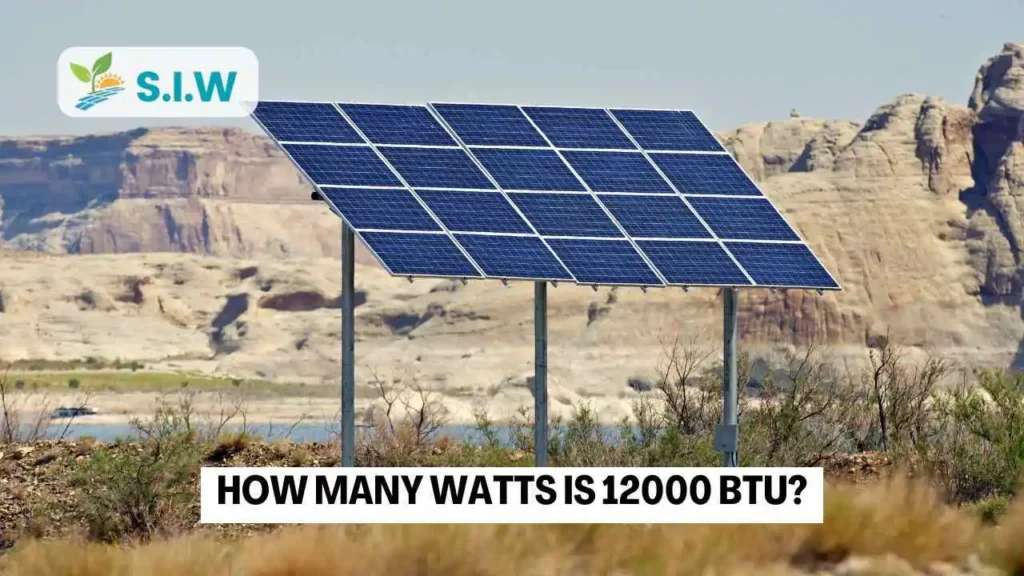When dealing with heating, ventilation, and air conditioning (HVAC) systems, understanding energy units is crucial for proper system selection and energy management. One common question that arises is, “How many watts is 12,000 BTU?” In this article, we delve into the conversion between BTU (British Thermal Units) and watts, explaining what it means for HVAC systems and how to calculate the wattage from BTU ratings.
Understanding BTU and Watts
1. What is a BTU?
A British Thermal Unit (BTU) is a unit of energy used to measure the amount of heat required to raise the temperature of one pound of water by one degree Fahrenheit. In HVAC systems, BTUs are used to quantify the cooling or heating capacity of an air conditioner, heater, or other climate control devices.
2. What is a Watt?
A watt (W) is a unit of power that measures the rate at which energy is used or transferred. It is commonly used to quantify electrical power consumption. One watt is equivalent to one joule of energy per second. In the context of HVAC systems, watts help in understanding the electrical power consumption for solar batteries required to achieve a certain heating or cooling capacity.
Conversion Between BTU and Watts
1. Conversion Formula
To convert BTUs to watts, you can use the following formula:
Watts=BTU/hr×0.293\text{Watts} = \text{BTU/hr} \times 0.293Watts=BTU/hr×0.293
This formula is derived from the fact that 1 BTU/hr is approximately equal to 0.293 watts. This conversion factor helps in translating the cooling or heating capacity of an HVAC system from BTU to wattage.
2. Calculating the Watts for 12,000 BTU
Applying the conversion formula:
Watts=12,000 BTU/hr×0.293\text{Watts} = 12,000 \text{ BTU/hr} \times 0.293Watts=12,000 BTU/hr×0.293
Watts=3,516 W\text{Watts} = 3,516 \text{ W}Watts=3,516 W
Therefore, a 12,000 BTU HVAC system is approximately equal to 3,516 watts. This calculation helps in understanding the power consumption of the system.
Implications for HVAC Systems
1. Electrical Power Consumption
Knowing the wattage equivalent of BTU ratings helps in assessing the electrical power consumption of HVAC systems. For example, a 12,000 BTU air conditioner consuming around 3,516 watts means you need to account for this power requirement when evaluating electrical capacity and energy costs.
2. Energy Efficiency
Energy efficiency ratings of HVAC systems are often expressed in terms of BTUs and watts. By converting BTU to watts, you can better understand the energy efficiency of the system. For instance, a system with higher BTU capacity but lower wattage consumption would be considered more efficient.
3. Proper Sizing
When selecting HVAC systems, it’s essential to match the unit’s BTU capacity with the appropriate electrical power supply. Understanding the wattage helps in ensuring that the electrical system can handle the load and avoid overloading circuits.
Examples of HVAC Systems
1. Air Conditioners
A typical residential air conditioner with a 12,000 BTU rating will consume approximately 3,516 watts. This information is crucial for solar power systems for home to ensure their electrical infrastructure can support the unit’s power requirements.
2. Heaters
Similarly, for electric heaters, understanding the wattage equivalent of their BTU rating helps in determining the heater’s power consumption and efficiency. A 12,000 BTU electric heater will also require around 3,516 watts.
3. Heat Pumps
Heat pumps with a 12,000 BTU rating will have similar power consumption characteristics. Knowing the wattage helps in evaluating the heat pump’s operational cost and energy efficiency.
Additional Considerations
1. Seasonal Energy Efficiency Ratio (SEER)
For air conditioners, the Seasonal Energy Efficiency Ratio (SEER) measures cooling efficiency. Higher SEER ratings indicate better efficiency, translating to lower energy consumption for a given BTU capacity.
2. Heating Seasonal Performance Factor (HSPF)
For heating systems, the Heating Seasonal Performance Factor (HSPF) measures heating efficiency. A higher HSPF rating means better efficiency, leading to reduced energy usage.
3. Energy Star Ratings
Many HVAC systems feature Energy Star ratings, which indicate high energy efficiency. Choosing Energy Star-rated systems ensures you get an efficient unit that uses less power for a given BTU capacity.
Conclusion
Converting BTU to watts provides valuable insight into the power requirements and efficiency of HVAC systems. For a 12,000 BTU system, the equivalent power consumption is approximately 3,516 watts. Understanding this conversion helps in selecting the right system, ensuring proper electrical capacity, and optimizing energy efficiency.
By accurately calculating and assessing these figures, you can make informed decisions regarding HVAC system installation, operation, and energy management. For further information on HVAC systems and energy efficiency, and to explore more on boosting your website traffic, visit Solar Industry Watch.








